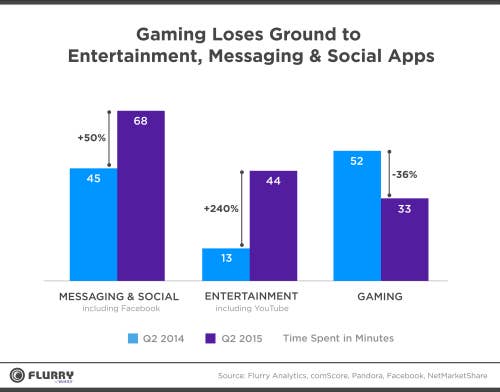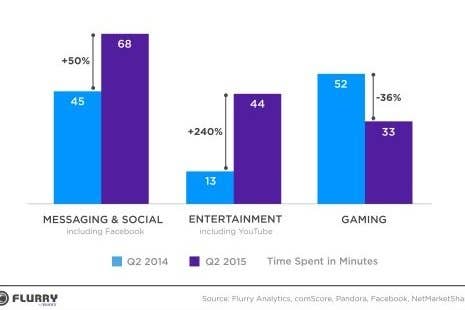Americans spending more time than ever on smartphones, but gaming time is falling
Shrinking share of screen time attributed to stagnation, eSports and the unwillingness to grind
An annual study into mobile usage in the US by Yahoo analytics firm Flurry has revealed a population more absorbed by their smartphones than ever before, but one which spends less and less time playing games with them.
Flurry's research found that, although American smartphone usage has gone up by around 35 per cent since last year, with the average owner spending three hours and 40 minutes per day using their devices, the time spent playing games has almost halved. Last year, gaming accounted for 32 per cent of phone usage for US citizens, 52 minutes a day. In the last 12 months it's fallen to just 15 per cent, or 33 minutes a day.
Flurry attributes that shift to three major factors: a lack of new hit games, with the top grossing charts remaining static; the rise of spectator gaming, as gamers spend more time learning by watching streaming services rather than playing; and the unwillingness of players to spend time grinding their way through games, instead paying their way to content via free-to-play mechanisms.

- "Lack of new hits: Gaming is a hit driven industry and there hasn't been a major new hit the past 6 to nine months. The major titles like Supercell's Clash of Clans, King's Candy Crush, and Machine Zone's Game of War continue to dominate the top grossing charts and haven't made room for a major new entrant.
- "Users become the game: Millennials are shifting from playing games to watching others play games, creating a new category of entertainment called eSports. This summer, Fortune named eSports, the new Saturday morning cartoons for millennials. In fact, some of the most watched content on Tumblr is Minecraft videos created and curated by the passionate Minecraft community.
- "Pay instead of play: Gamers are buying their way into games versus grinding their way through them. Gamers are spending more money than time to effectively beat games or secure better standings rather than working their way to the top. This explains the decline in time spent and the major rise in in-app purchases, as Apple saw a record $1.7B in AppStore sales in July."
The study also indicates an increasing reliance on apps rather than the browser, with browser usage now accounting for just ten per cent of smartphone usage and apps the remaining 90. Messaging an social app use rose particularly quickly, although the researchers believe that a great deal of app and social network usage is actually spent consuming content, just not via the original website.

